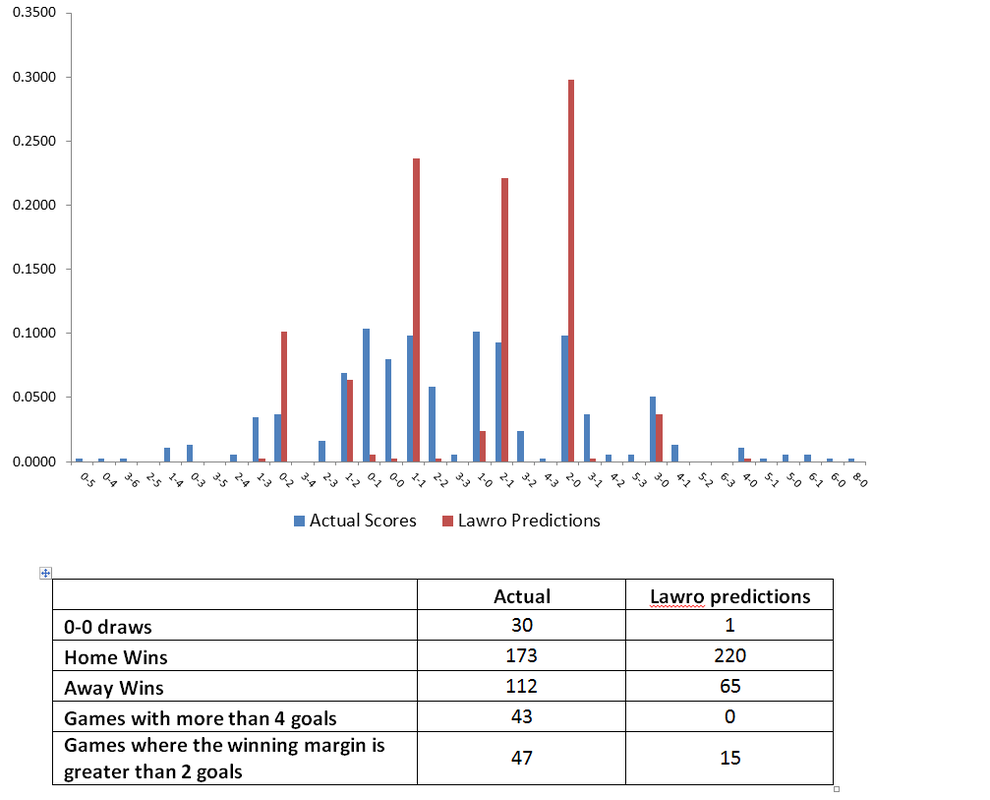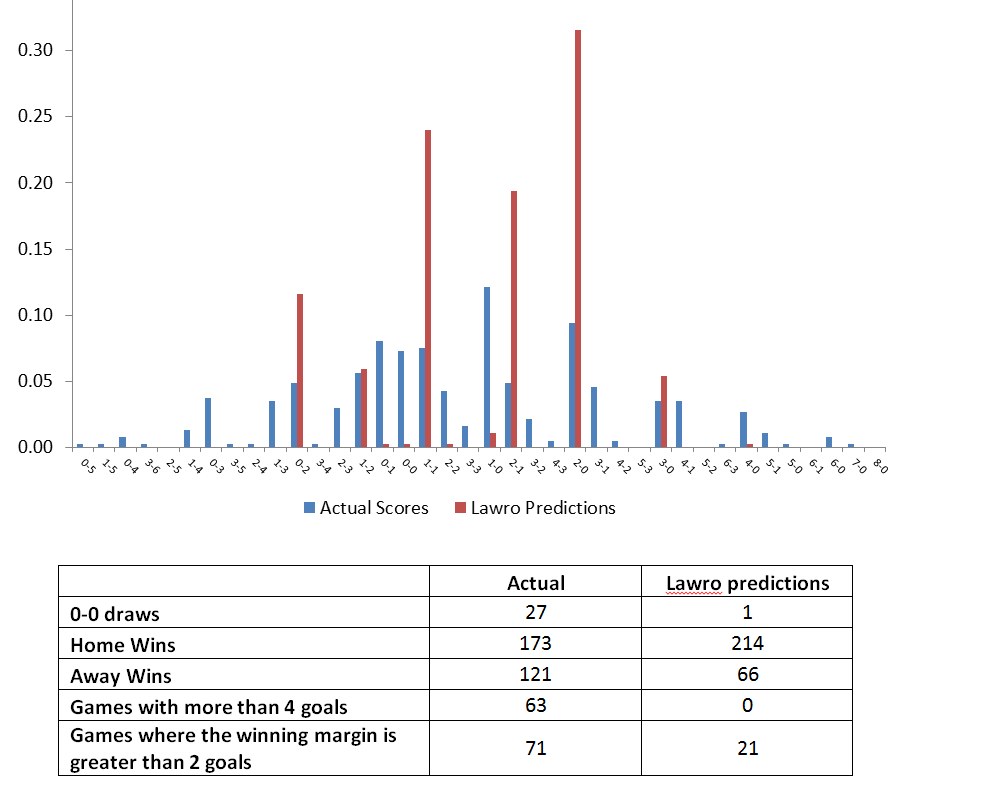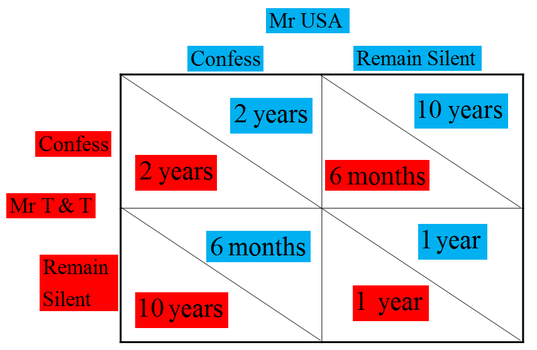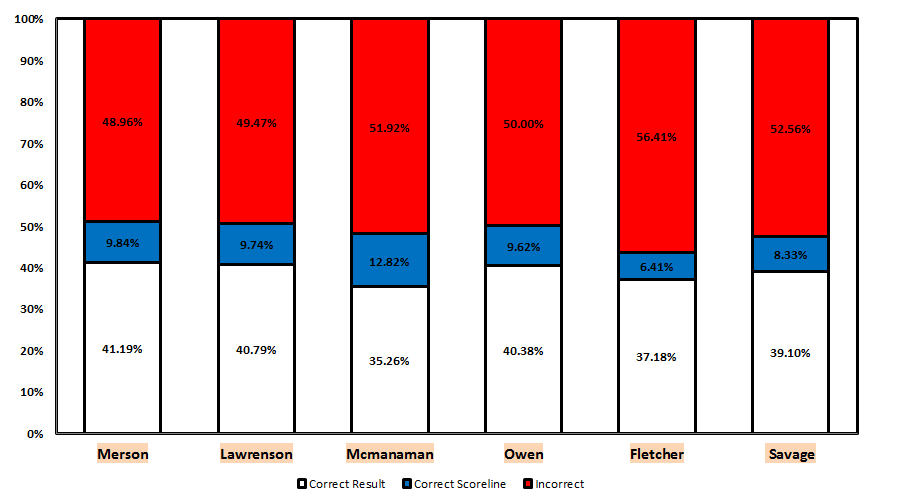Until then, have a great summer!
|
As always, we are taking our summer break. We'll be back on Monday 20th of July. Until then the website will be undergoing maintenance - apologies if there are access issues.
Until then, have a great summer! By David Butler
The latest Deloitte Annual Review of Football Finance can be found here. Some key points that are good for the Premier League are below - revenues are increasing, wages and revenues are coming closer together again and debt is being reduced. 1. “Record Premier League revenue of £3.26 billion represented a £735m (29%) increase on 2012/13, due to 2013/14 being the first year of the current broadcast rights packages” 2. “The overall Premier League wages/revenue ratio fell dramatically to 58%, its lowest level since the 1998/99 season” 3 “Premier League clubs’ aggregate net debt reduced to £2.4 billion in 2014, with record levels of cash now present in balance sheets” Deloitte predict future growth in the industry. By John Eakins Last March I wrote about how Mark Lawrenson’s premier league predictions were a good example of System 1 biases (see here). I promised an update at the end of the premier league season. As one can see from the graph and table below, these biases persist over the whole season. He greatly under predicts the number of 0-0 draws, a particular error that I describe as a tendency to predict that something will happen rather than nothing will happen. He also over predicts the number of home wins and under predicts the number of away wins. His predictions of the final scores are biased toward lower scores (under predicts the number of games with more than 4 goals) and are also biased toward closer games (under predicts the number of games where the winning margin is greater than 2 goals). Out of interest I looked at his predictions for the 2013/2014 premier league season. The graph and table for this set of data is given below. I was confident enough that the same biases would appear and but what did surprise me was the similarity of his ‘mistakes’ between the 2013/2014 and 2014/2015 seasons. One can see that the 2013/2014 graph below has almost the same distributions as the 2014/2015 graph above. And the table shows very similar levels of over/under predictions as compared to the 2014/2015 season.
So why doesn’t Lawrenson learn to correct his ‘mistakes’. Again it comes back to the whole idea of the automatic or impulsive part of the brain (System 1) overriding the reflective or controlled part of your brain (System 2). This generates predictions which are not rational especially when there is past information which should lead you to change your behaviour. It would be interesting to see if the trend continues next season. Assuming System 1 biases hold one would expect that it will. By David Butler
For the 2017-18 Premier League season Tottenham Hotspur will not play their home matches at White Hart Lane as the stadium and surrounding area will be regenerated. Previously, I discussed this project in light of the Coase theorem and bargaining. Two ground share options have been proposed and are currently being pursued. These involve Tottenham playing home matches at either Wembley or Stadium:MK in Milton Keynes. The Tottenham fans have expressed a preference to play at Wembley, despite it being a more expensive option, and have also suggested that remaining within London is important to the club’s identity. Emotions may seem to trump logic here as sharing the Olympic stadium with West Ham, the Emirates with Arsenal or Stamford Bridge with Chelsea are non-runners for reasons that do not need to be discussed. If Tottenham cannot secure Wembley, why not Croke Park? In Dublin lies a stadium with a 82,300 capacity and is home to largely summer sports. I'm sure the GAA could earn impressive revenues from renting Croke Park to Tottenham for the winter and spring months and Tottenham would have access to one of the world’s finest stadiums, a capacity far greater than Stadium:MK and fewer logistical problems associated with sharing a ground. They would play in an international city with transport links to all major European airports. Is the proposal crazy? It may easily be - I am not familiar with the rules in the area and it could easily be the case that Premier League matches must take place in England or Wales. There is also a question of demand.I’m sure Tottenham versus Manchester United, Liverpool, Arsenal, Chelsea and Manchester City would be full houses in Croke Park but, for instance, how many fans would be attracted to a home tie in the Europa Cup on a cold Thursday night? Finally, would this be opening a can of worms in terms of the further internationalisation of the Premier League? Yes – if Tottenham played in Croke Park, despite it only being for an interim period, why not play Premier League games in Beijing or New York? This is an endeavour I can foresee in the future. The Londoners would clearly lose out, as would the League of Ireland (who previously had objections to Wimbledon playing in Dublin). The Irish Tottenham fans would of course be very happy, as would other Premier League fans in Ireland, who would get to see their favourite team play Premier League matches in Ireland. Would it make economic and logistical sense for Tottenham? Perhaps, especially given the stadiums capacity. The happiest of all – surely Michael O'Leary! By Robbie Butler
Yesterday, I watched the opening minutes of the Ireland England friendly international. Having considered travelling to Dublin for the game, I was happy I didn’t having watched the first five minutes. The atmosphere seemed flat and muted, in complete contrast to the last time the two teams met in Dublin in February 1995. I started to question the value of the match. No doubt the players got to sharpen up before next weekend’s game with Scotland, and the management had a chance to view some fringe players in action. However, I think the real value might be the FIFA world ranking points that were amassed from the game. Previously, (here) I explained how these points are calculated. While some might think these are meaningless, they are used to determine seeding in qualifying tournaments. For the 2016 European Championship Qualifiers Ireland were a 2nd seed. This is very important to our chance of qualifying as we only have to play one team ranked higher than us (at the time of the draw) in qualifying. Our performance in the world ranking charts hasn’t been good of late. Last year, he Boys in Green fell out of the top 70 for the first time since ranking began, and while we are now back at 60th position, this places us behind the likes of Cape Verde Islands (38), Northern Ireland (44) Equatorial Guinea (50) and Gabon (59). The team’s performances since September have been encouraging. Since Euro 2016 qualifying began, the team have played seven games; won three, drawn three, and lost one. The value of each is as follows (excluding Gibraltar as they are not part of the FIFA World Rankings): Georgia (675), Germany (498), USA (516), Scotland (0), Poland (415), and England (185). 185 points for yesterday’s result. I suppose it all adds up. By John Considine What does the Irish American Football Association (IAFA) have to do with FIFA and the FAI? Not a lot but one could be confused by the amount of acronyms flying around the place this week. There was the story about FIFA Ireland (FIFAI, I suppose) and how it had no employees in Ireland (here). This seemed to be money flowing out of Ireland to Zurich. Then there was the story about money making its way from FIFA to the FAI courtesy of a non-decision by a referee (here). This latter story was the main front-page headline on yesterday's Irish Examiner. On page 3 of the same paper there was a headline "American football returns to Aviva" (here).
The second Irish Examiner says that the "Dublin Chamber of Commerce has predicted the match [between Boston College and Georgia Tech] will be worth €24m to the local economy." This is about one quarter of the €100m figure that UCF Athletics Association claimed was the economic impact of the 2012 game between Notre Dame and Navy. These details are available in Record 13 of a Freedom of Information request (here). In the same letter from UCF, to the then Minister for Sport, the UCF said "we respectfully request €1.5m in financial assistance". It is here that the IAFA enter the story. The UCF letter says "We also ask for your department's commitment to support the game. This support extends to granting full authority over the game itself to us and our chosen partners, without any involvement from the Irish American Football Association (IAFA). This would be a regular season NCAA game and as such the IAFA has no jurisdiction." The UCF letter is dated May 1, 2013. Record 14 of the Freedom of Information request (FoI rather than FAI) contains a request from the IAFA to the Minister to attend the European Federation of American Football (EFAF) Atlantic Cup being held in Dublin at the end of June 2013. The event was part of a year long government tourism plan called "The Gathering". Interestingly, those advising the Minister suggested he should not attend. It is difficult to determine the exact reasoning. It is possible that Record 15 could provide some insight. That record contains a letter from the Department of Sport to the Chief Executive Officer of the Irish Sports Council. One sentence from the letter says "The Minister is concerned that teams considering visiting Ireland are being actively discouraged by the stance that has been adopted by the IAFA towards these visits". Another sentence says "The Minister has requested that the Sports Council urgently engage with the Irish American Football Association to ensure that, as a Government recognised and funded national governing body for sport, the Association does not in future act in a manner that is damaging to the development of tourism as a crucial area of economic activity". The IAFA were not the only Irish entity to find that they were getting less of the action than they wanted. In another Freedom of Information request (here), Record 12 documents how some of the rights to travel arrangements and ticket sales were allocated. It would be fair to say that at least one local wondered about the benefits to their part of the local economy. If the last couple of days, and the above examples, have taught us anything then it should be that there is no divorcing sport from money (and politics) at the highest level. [For those interested in the Freedom of Information on these matters, a greater range of documents can be found here and here.] Robbie Butler has also blogged about a related issue (here) By Robbie Butler The crisis at FIFA this week has been astonishing. In the thirty years that I have been a follower of football I can never remember a week like it. If stories are to be believed, the investigation has been brought to a head by former Fifa official Chuck Blazer who admitted taking payments for various events in the past, including the 1998 and 2010 World Cups. Why did the man known as “Mr 10%” break ranks and squeal to the FBI? According to the Sunday Times this week Blazer’s decision to “go native” can be traced to a spilt-second moment in December 2010 when he and long-time friend Jack Warner voted for the 2022 World Cup. To Blazer’s astonishment he discovered that Warner, the then head of CONCACAF, voted against the United States World Cup bid (in favour of Qatar) despite the US being under CONCACAF’s remit. This was a betrayal “Mr 10%” could not forgive, and it lies at the very heart of the problems facing those at FIFA today. Blazer is now not alone. This week Jack Warner has said he is prepared to ‘tell all’. One can only assume this is to minimise, or attempt to avoid, the list of criminal charges that are coming down the track at him. Will others follow their lead? Probably. It appears the classic economic concept of the Prisoner’s Dilemma has worked a treat. This concept demonstrates how an equilibrium for a game can generate a sub-optimal outcome for all parties involved. With co-operation higher pay-offs could be achieved to the benefit of both players. This is what has been happening at FIFA for years. Now however, the FBI have really stacked the incentives so the conditions for mutual cooperation are absent. The following scenario is posed: Two criminals are detained by the police for questioning following their suspected involvement in a recent burglary. The police have enough evidence to convict both suspects for at least a minor charge. The two are brought to separate interrogation rooms and grilled by local detectives. They are each individually offered a two options by the detectives. The two prisoners, Mr USA and Mr Trinidad & Tobago (T&T), have two choices to decide upon; confess to their crime or remain silent. No communication with their co-accused is possible. The following matrix describes the options on offer. Mr USA & Mr T&T will serve just one year if both remain silent.This is the best outcome for the group. It seems obvious to stay silent when, if both confess, they will serve 2 years each. However, here's the catch. As neither can know for certain what the other will do, the strategy of confessing is strictly dominant for each player. This means that whatever the other player does, confessing yields an outcome at least as good as, and possibly better, than remaining silent. If one confesses and the other remains silence, the confessor (due to their willingness to co-operate with police) serves just 6 months, while the one remaining silent is handed a sentence of 10 years! As communication is not possible both Mr USA and Mr T&T fear the other will confess, which forces them to individually confess. Remarkably, what the Prisoner’s Dilemma demonstrates is that even when people do what is best for them, the outcome for the group can be sub-optimal. In other words, the Prisoner’s Dilemma shows how rational, self-interested people each acting individually can make decisions that lead to an irrational outcome for the group as a whole. By David Butler
For 2014-2015 English Premier League season I followed the predictions of soccer pundits. The judgements of Paul Merson, Steve McManaman, Michael Owen, Robbie Savage and Darren Fletcher have all been put under the spotlight. John Eakins has also provided the data on Mark Lawrenson's predictions. We now have a sizeable dataset on Sky Sports, BT and BBC soccer experts who systematically predict. Below is a graph that shows the success of each pundit in percentage terms. While the sample size is lower for the BT experts, a common pattern still emerges – the pundits called approximately half of the matches (in)correctly - depending on your philosophical perspective! They predict the correct score line roughly 10% of the time. By David Butler
The May Journal of the National Institute of Social and Economic Research includes a section dedicated to sports economics. The contents can be accessed here. The first two articles are open access, 'Sports Economics: It May be Fun but What's the Point?' and 'Transfer Spending in the English Premier League: The Haves and the Have Nots'. In the first article the Alex Bryson, Bernd Frick, and Rob Simmons forward several reasons why there is validity in studying sport from an economic perspective and deal with several of the criticisms that suggest it is a trivial pursuit. In the second article Richard Burdekin and Michael Franklin use data from the Deloitte Annual Review of Football Finance to give an overview of the spending patterns of EPL clubs, finding that the improved performances of clubs has come at a cost - profits! Pete Lunn and Elish Kelly of the ERSI also bring an Irish flavour to the edition with their work on participation in school sport. By Robbie Butler
I recently wrote a piece on the difficulties facing the Irish operation of Ladbroke’s Bookmakers which entered a period of examinership a number of weeks back. It is believed part of this strategy is in an attempt to renegotiate rates paid to shop landlords, many of which were established during the Celtic Tiger years at premium prices. This story has taken a twist however. The Irish Times reports that Boylesports have now entered the fray and are attempting to take over Ladbrokes Operations in Ireland. Should Boylesports be successful they will become the largest bookmaker chain in Ireland and save many of the shops and jobs threatened by Ladbrokes’ current difficulties. The bid is subject to approval by the Competition and Consumer Protection Commission. The landscape of Irish bookmakers is changing quite rapidly in recent times. The market is becoming far more concentrated. Independent turf accountants are becoming few and far between. Celtic Bookmakers was taken over in 2011, while Hacketts Bookmakers reduced the number of shops it operates in early 2014, which some closures and others taken over by Paddy Power. The Ladbrokes/Boylesports case will be one to watch closely. |
Archives
June 2024
About
This website was founded in July 2013. Categories
All
|




 RSS Feed
RSS Feed